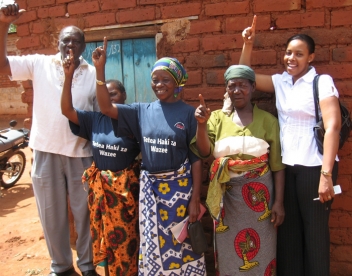 Wilbur has an energetic commanding character, a retired secondary school teacher and journalist, he says “I retired 15 years ago but although retired, I am not tired.”
Wilbur has an energetic commanding character, a retired secondary school teacher and journalist, he says “I retired 15 years ago but although retired, I am not tired.”
Born on the slopes of Africa’s highest mountain Mount Kilimanjaro, he is happy living in the shadow of the Acropol mountains with his wife, chickens, goats pineapples, bananas and mangoes – he is self sufficient. But he is well aware that many of his older neighbours are struggling to eat, unable to afford medical care and that the poorest are those who are raising grandchildren alone because they have lost their parents to AIDS.
Helping older people who give so much
“We started Morogoro Retired Teachers’ Association, (MORETEA) in 1998. At first it was just retired teachers but we have retired people of all sorts, policemen, farmers, fishermen. From the start we wanted to help older people in the neighbourhood who give so much to their communities but with declining strength to work the fields these people now face extreme hardship and the isolation that comes with it.
“They can’t get credit from the village bank or afford to send their children or grand children to school or even offer a cup of tea to visitors, this marginalises them,” he explains.
Wilbur introduced us to the other members of MORETEA, who gave us a detailed run down of all their achievements:
- Identity cards and free health care for 1,108 older people
- AIDS awareness training which has seen the number of older people attending testing centres rise from 2 to 25 a month and the number of grandchildren attending school rise from 19 to 168
- 270 women trained in basic legal services who advise older women threatened by violence or of being robbed of their rightful inheritance -30 women have regained their homes so far.
- Providing goats, chickens and beehives to over 500 families headed by older people – supplementing their daily diet of porridge and vegetables with milk and eggs and offering them the opportunity to earn a small income.
Communities working together
I was struck by the transparency and democracy of the association. All the data collected and projects run were recorded on hand drawn charts stuck to the walls of the community centre. Members took turn to describe their success and plans for expansion in the future.
“Decisions on who receives baby goats or which families receive school uniforms are made by the community themselves,” Wilbur explains.
Wilbur was most proud that the local government has begun to allocate funds for helping older people earn a living and get health care. In some areas village leaders have also implemented long term plans to support their older people including fetching water, building toilets, washing clothes and repairing houses.
“Working with HelpAge we have achieved so much”
Coverage is far from complete but it is a good start. “By working with HelpAge we achieved so much and got money from Comic Relief, EU, DFID and other donors. But what we really want is for the government to hear the voice of older people and ensure they get the services they have a right too.”
“It is a good place to grow old, but not if you have no income,” he said. MORETEA is currently working with the Tanzania National Older Peoples forum and HelpAge to secure a pension for all older citizens in Tanzania. Today the government of Zanzibar pledged a pension for every one over 65 so may be it will be possible in Morogoro too.
Read more about HelpAge’s work in Tanzania.
